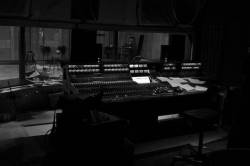It’s a music recording studio built to redefine studios, a three-story instrument that blurs the line between organic and digitally manipulated sound, and a playground for sound waves and instruments. It’s Spears’s giant, concrete rescue breath for an industry that underwent a bad digital overhaul in the 90’s and lost its identity in the process.
The tall, boxy and gray exterior hardly advertises aural pizzazz, but when you walk through the door of Squid Hell, it’s like taking the Magic School Bus inside a vessel that’s part guitar, part xylophone. Close the door: sound waves travel in two directions – echoing one way and abruptly halting in the other, as if someone hit the damper pedal and the soft pedal of a piano simultaneously. The effect is created by careful construction that shapes sound from the building’s foundations to its rafters. Within the same room, a listener might be acoustically transported from a cathedral to a cozy piano bar.
Spears’ vision of his analog/digital studio formed when the digital recording age emerged in the 90’s. Around this time, he started a recording business out of a room in his apartment in Boston with mostly digital equipment. Eventually, he realized something was missing from his recordings. The sound was unnatural and perfect … too perfect. It lacked the distortions characteristic of recording environments, which sometimes shape sounds unexpectedly into what become new, innovative masterpieces.
We hear in analog, which is why the distortions that screamed through Jimi Hendrix’s amplifier could not be reproduced authentically without a non-digital, analog system, and the haunting echo in Radiohead’s “OK Computer,” recorded in an empty English castle, could not be duplicated using a personal computer.
When commercial studios began failing as home studios boomed, Spears bought up their analog gear. He bought an old paint warehouse in an industrial neighborhood in Jamaica Plain for storage, and eventually realized it was the perfect space to reconstruct what was lost in the recording industry.
Raising the money from private investors, Spears tuned the warehouse into an acoustical masterpiece : Squid Hell Studios, named after an actual person – his high school band mate Richard Hell, nicknamed Squid.






